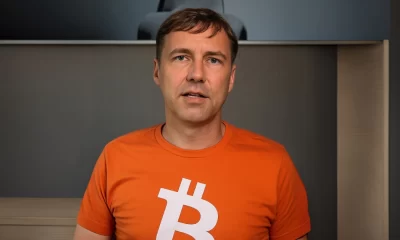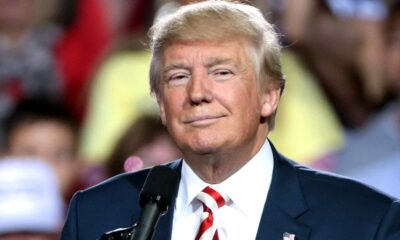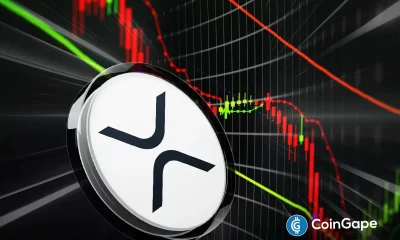24/7 Cryptocurrency News
D.O.G.E. Is Crucial for Fighting US Inflation
Published
4 months agoon
By
admin
The naming of the Department of Government Efficiency, D.O.G.E., under the forthcoming administration of Donald Trump, has caused much debate especially when it comes to US inflation – Tyler Winklevoss. Tyler, the co-founder of Gemini, commented on D.O.G.E., which proposed to root out government waste and fight US inflation that rose over 2.6%. He has insisted that such initiatives are crucial in the fight against the “silent tax” of inflation, which affects poor Americans most.
D.O.G.E. Is Crucial to Combat Inflation’s ‘Regressive Pressure’
The announcement of the Department of Government Efficiency (D.O.G.E.) under a potential Trump administration has sparked considerable debate. Tyler Winklevoss, co-founder of Gemini, weighed in on the proposed initiative, which aims to eliminate wasteful government spending and tackle the price rise. US inflation rose by 2.6% year-over-year last month, slightly up from September.
He emphasized the importance of addressing the price rise, a “silent tax” that disproportionately burdens low-income Americans, arguing that such measures are essential for economic fairness and sustainability.
Be it as it may, Tyler Winklevoss, who recently criticized SEC Chair Gary Gensler, calling him evil, said now that inflation requires a more innovative approach to manage because it works to destroy wealth and exert regressive pressure on economies, particularly those that are ill-equipped to bear it.


The Department aims to reduce federal inefficiencies, but its potential impact on US inflation remains a main subject. Critics suggest that the lack of clear governmental power could limit D.O.G.E.’s ability to tackle it effectively.
Previously, Tyler severely criticized the Chairman of the SEC, Gary Gensler, over his approach to regulating cryptocurrencies. Specifically, he exclaimed that Gensler should be permanently removed from any positions of influence, claiming he undermined the crypto industry to further his political ambitions.
Meanwhile, the US dollar is constantly weakened as a store of value because of the increase in the money supply by the Federal Reserve. Keeping these factors in mind, the Winklevoss brothers are of the view that Bitcoin is going to grow significantly.
This is upon the basis of the fact that its adoption—majorly by central banks—could see a spike in price, probably up to $500,000 per coin. Just for comparison, regarding the inflation, recently Peter Brandt predicted Bitcoin to go bullish, suggesting that the crypto could hit new highs in the coming days.
Tyler Winklevoss Urges Action on Inflation’s Impact on Low-Income Americans
The US inflation rose by 2.6% year-over-year last month, slightly up from September. This follows a series of rate cuts by the Federal Reserve. These cuts aimed to address cooling prices and a weaker labor market. The October Consumer Price Index (CPI) met predictions and marked a rise from September’s 2.4%. This increase coincided with a 0.5 percentage point rate cut and a second reduction in November.
The Winklevoss twins were describing some unique attributes that set Bitcoin apart: its immutable supply of 21 million coins creating scarcity and a decentralized system offering security and protection against physical seizure. Such qualities make it “digital gold” or “gold 2.0.”
Tyler Winklevoss views Bitcoin’s scarcity and decentralization as key solutions to counter inflation and protect against economic instability. He advocates for embracing innovative financial tools to ensure equitable opportunities in the face of rising costs.
In contrast to more traditional inflationary hedges such as oil, gold, and the US dollar, Bitcoin is resistant to geopolitical volatility and central bank manipulation. Whereas oil, though necessary, undergoes price discrepancies, gold faces practical challenges regarding transportation and the risk of confiscation.
Teuta Franjkovic
Teuta is a seasoned writer and editor with over 15 years of experience in macroeconomics, technology, and the cryptocurrency and blockchain industries.
Starting her career in 2005 as a lifestyle writer for Cosmopolitan, she expanded into covering business and economy for several esteemed publications like Forbes and Bloomberg.
Influenced by figures like Don and Alex Tapscott and Laura Shin, Teuta embraced the blockchain revolution, believing crypto to be one of humanity’s most crucial inventions.
Her fintech involvement began in 2014, focusing on crypto, blockchain, NFTs, and Web3. Known for her excellent teamwork and communication skills, Teuta holds a double MA in Political Science and Law.
Disclaimer: The presented content may include the personal opinion of the author and is subject to market condition. Do your market research before investing in cryptocurrencies. The author or the publication does not hold any responsibility for your personal financial loss.
Source link
You may like


‘Positive But Cautious’ Investors Pour Capital Into Ethereum, Solana, XRP and Sui: CoinShares


Bitcoin As The Global Denominator Of Capital


Trump’s Crypto Dealings Are Making Regulation ‘More Complicated’: House Financial Services Chair


Pontus-X taps Oasis for private, cross-border data sharing in E.U.


Elon Musk, Dogecoin Proponent and U.S. Agency Figurehead, Says ‘No DOGE in D.O.G.E.’


Crypto Investor’s Brave Yet Hilarious Prediction Speculates If XRP Price Will Hit $3,000 This Cycle
24/7 Cryptocurrency News
Japan Set To Classify Cryptocurrencies As Financial Products, Here’s All
Published
1 day agoon
March 30, 2025By
admin
Cryptocurrency investors in Japan are bracing for impact following a plan to reclassify digital assets as financial products. While the plan has elicited excitement from cryptocurrency enthusiasts in the Far East, the ambitious plan will have to scale several legislative hurdles.
Japan Targets Reclassification Of Cryptocurrencies As Financial Products
According to a report by Nikkei, Japan’s Financial Services Agency (FSA) is inching toward classifying cryptocurrencies as financial products. Per the report, the FSA intends to achieve the reclassification via an amendment to the Financial Instruments and Exchange Act.
Currently, digital assets in Japan are considered crypto assets conferred with property rights and seen as payment means. Under the FSA’s plans, cryptocurrencies in Japan will be treated as financial products in the same manner as traditional financial products.
The FSA says it will adopt a slow and steady approach toward the reclassification, carrying out “a private expert study group” to test the waters. If everything goes according to plan, the FSA will submit the amended bill to Parliament in early 2026.
The classification of cryptocurrencies as financial products will have far-reaching consequences for the local ecosystem. Experts say treating cryptocurrencies as financial products will bring Japan closer to a crypto ETF launch amid a changing regulatory landscape.
Furthermore, the move may lower current cryptocurrency taxation for local investors since existing capital market rules will apply to the asset class.
A Fresh Bill For Crypto Insider Trading Is Underway
Apart from the reclassification, the FSA disclosed plans for new legislation against insider trading. The move flows treating cryptocurrencies as financial products and will strengthen existing investor protection rules.
“It is a direction to establish a new insider trading regulation that prohibits trading based on unpublished internal information,” said the FSA. “We will develop laws to prevent unfair transactions.”
However, Japan’s cryptocurrency scene is heating up to a boil, driven by local and international players. Last week, stablecoin issuer Circle secured approval from the FSA for USDC with top exchanges set to list the stablecoin.
Japan’s Metaplanet has tapped Eric Trump to join its Strategic Board of Advisors as it continues to load up Bitcoin.
Aliyu Pokima
Aliyu Pokima is a seasoned cryptocurrency and emerging technologies journalist with a knack for covering needle-moving stories in the space. Aliyu delivers breaking news stories, regulatory updates, and insightful analysis with depth and precision. When he’s not poring over charts or following leads, Aliyu enjoys playing the bass guitar, lifting weights and running marathons.
Disclaimer: The presented content may include the personal opinion of the author and is subject to market condition. Do your market research before investing in cryptocurrencies. The author or the publication does not hold any responsibility for your personal financial loss.
Source link
24/7 Cryptocurrency News
BitGo CEO Calls For Regulation Amid Galaxy Digital’s Settlement
Published
2 days agoon
March 29, 2025By
admin
Mike Belshe, the CEO of BitGo, has commented on the recent settlement between Mike Novogratz’s Galaxy Digital and the New York Attorney General (NYAG). Known as one of the top advocates of deregulation, Belshe, per his latest updates on X, appears to favor regulatory intervention to prevent some fraudulent practices in the industry.
BitGo CEO Comments on Galaxy Digital Settlement
Responding directly to a post from Anthony Scaramucci, Belshe said it is hard to deny that NYAG laid a compelling case against Galaxy Digital. He highlighted the firm’s pump-and-dump actions. The BitGo CEO noted that selling tokens as soon as they are vested and shilling to HODL when one is actually selling is wrong.
Notably, he reiterated his respect for Novogratz and his contributions to the industry. However, considering the NYAG’s position, Mike Belshe said Galaxy Digital’s actions are unethical.
‘So, legal overreach or not, it’s not ethical, and this type of behavior makes our entire industry look bad. Unchecked, this is what leads to “over-regulation,”’ he said, advocating for users to read the controls put onto Galaxy as part of this settlement!
The Advocacy for Crypto Regulation
As reported by CoinGape, Galaxy Digital settled with NYAG with $200 million over the controversial Terra (LUNA) sales. The BitGo CEO said if the right regulations are not in place and top leaders are this manipulative, the industry may not be taken seriously.
In his calls for oversight, Mike Belshe defined this as ‘Principles-based regulation.’ He further explained what he meant, noting that no one should lie to promote assets they hold. He also advocated that influential leaders should not tell others to buy while hiding the fact that they are selling.
Over the past few years, industry leaders have often denounced the regulation through key regulators’ enforcement tactics. Things have changed drastically since Mark Uyeda came on board as Acting Chair of the US SEC.
The commission has even established a Crypto Task Force to help introduce frameworks to guide the industry.
President Trump Fulfilling Campaign Promises
The BitGo CEO’s new crypto regulation push is not on the radar. While industry experts like John Deaton agreed with his proposition, US regulatory agencies are cleaning the house to help fulfill President Donald Trump’s campaign promises.
In a recent update, the FDIC advised Federal Banks about crypto. The commission said financial institutions under its umbrella do not need prior approval to gain exposure to the crypto industry. Thus far, this positive regulatory shift has triggered a new adoption trend for the digital currency ecosystem.
One of the core positive moves was Fidelity Investments’ launch of a stablecoin on a public blockchain.
Godfrey Benjamin
Benjamin Godfrey is a blockchain enthusiast and journalists who relish writing about the real life applications of blockchain technology and innovations to drive general acceptance and worldwide integration of the emerging technology. His desires to educate people about cryptocurrencies inspires his contributions to renowned blockchain based media and sites. Benjamin Godfrey is a lover of sports and agriculture.
Disclaimer: The presented content may include the personal opinion of the author and is subject to market condition. Do your market research before investing in cryptocurrencies. The author or the publication does not hold any responsibility for your personal financial loss.
Source link
24/7 Cryptocurrency News
Here’s Why Crypto Market Is Bleeding Today
Published
2 days agoon
March 29, 2025By
admin
The drawdown in the broader crypto market has extended to this weekend as losses shifted from Bitcoin (BTC) to altcoins. The combined market cap has lost 2.82% to $2.68 trillion, which suggests the selloff might deepen more. With the mix of bullish news in the trailing 7-day period, the question among analysts remains what is behind the latest slump.
What Is Behind Crypto Market Crash?
Since the inauguration of President Donald Trump, the broader digital currency ecosystem has witnessed positive backing.
As reported earlier by CoinGape, President Trump granted full pardon to Arthur Hayes, and other BitMEX co-founders Benjamin Delo and Samuel Reed. While this news is localized to the beneficiaries, it generally signals the positive shift in White House’ perception of the industry.
Despite these updates, the crypto market is still reeling with losses. The same Trump administration’s trade policies have continued to weigh down investor sentiment. The April 2 reciprocal tariff timeline has placed investors on the edge.
These tariffs and trade wars have ushered in economic uncertainties and potential inflation drag. With the Federal Reserve keeping rates unchanged, the impact of inflation may force traditional firms to adjust their positions. This in turn impact the crypto market sentiment overall.
Bitcoin and Altcoin Performance Review
As of writing, the price of BTC has lost its $83,000 support and currently trading at $82,476.30 per data from CoinMarketCap. The top coin has fallen by 2.43% in 24 hours and has extended its Year-to-Date (YTD) losses to 12.5%.
Top altcoins have also lost their positions with Ethereum down 2.25% to $1,846. XRP has fallen by more than 3% to $2.115, while Cardano has shed off 3.92% to $0.6721. The altcoin response has seen Dogecoin forming a wedge pattern in what may serve as a make-it-or-break-it switch for the memecoin.
While it appears as though many of these top assets are bottoming out, their correlations with Bitcoin may extend their overall drawdow.
What Next for the Crypto Market?
Thus far this year, top coins like Bitcoin have often showcased resilience in the face of massive sell-off and crypto liquidations. Although the current price floor for Bitcoin remain undefined, with analysts keeping an eye on the $82,000 floor.
The digital currency has not breached this level in close to two weeks. While legendary trader Peter Brandt agrees BTC price may fall to $65,635, this bearish projection may be averted if the $82,500 support holds through the weekend.
Altcoins may likely boost their price recovery by relying on BTC breakout and their internal fundamental updates.
Godfrey Benjamin
Benjamin Godfrey is a blockchain enthusiast and journalists who relish writing about the real life applications of blockchain technology and innovations to drive general acceptance and worldwide integration of the emerging technology. His desires to educate people about cryptocurrencies inspires his contributions to renowned blockchain based media and sites. Benjamin Godfrey is a lover of sports and agriculture.
Disclaimer: The presented content may include the personal opinion of the author and is subject to market condition. Do your market research before investing in cryptocurrencies. The author or the publication does not hold any responsibility for your personal financial loss.
Source link

‘Positive But Cautious’ Investors Pour Capital Into Ethereum, Solana, XRP and Sui: CoinShares

Bitcoin As The Global Denominator Of Capital

Trump’s Crypto Dealings Are Making Regulation ‘More Complicated’: House Financial Services Chair

Pontus-X taps Oasis for private, cross-border data sharing in E.U.

Elon Musk, Dogecoin Proponent and U.S. Agency Figurehead, Says ‘No DOGE in D.O.G.E.’

Crypto Investor’s Brave Yet Hilarious Prediction Speculates If XRP Price Will Hit $3,000 This Cycle

Dogecoin (DOGE) Bulls In Trouble—Can They Prevent a Drop Below $0.15?

California introduces ’Bitcoin rights’ in amended digital assets bill

MELANIA Insider Hayden Davis Selling Millions of Dollars Worth of Memecoin Amid 95% Drop: On-Chain Data

Toulouse starts to accept crypto for public transport

Bitcoin, Crypto Prices Slide as Trade Tensions, Inflation Risks Rattle Markets

Will BlackRock Investors Stay Bullish?

Bitcoin Could Appear on 25% of S&P 500 Balance Sheets by 2030, Analyst Says

Centralization and the dark side of asset tokenization — MEXC exec

Bitcoin Support Thins Below $78,000 As Cost Basis Clusters Shift Toward $95,000

Arthur Hayes, Murad’s Prediction For Meme Coins, AI & DeFi Coins For 2025

Expert Sees Bitcoin Dipping To $50K While Bullish Signs Persist

Aptos Leverages Chainlink To Enhance Scalability and Data Access

Bitcoin Could Rally to $80,000 on the Eve of US Elections

Sonic Now ‘Golden Standard’ of Layer-2s After Scaling Transactions to 16,000+ per Second, Says Andre Cronje

Institutional Investors Go All In on Crypto as 57% Plan to Boost Allocations as Bull Run Heats Up, Sygnum Survey Reveals

Crypto’s Big Trump Gamble Is Risky

Ripple-SEC Case Ends, But These 3 Rivals Could Jump 500x

Has The Bitcoin Price Already Peaked?

A16z-backed Espresso announces mainnet launch of core product

Xmas Altcoin Rally Insights by BNM Agent I

Blockchain groups challenge new broker reporting rule

The Future of Bitcoin: Scaling, Institutional Adoption, and Strategic Reserves with Rich Rines

Trump’s Coin Is About As Revolutionary As OneCoin

Is $200,000 a Realistic Bitcoin Price Target for This Cycle?
Trending

 24/7 Cryptocurrency News5 months ago
24/7 Cryptocurrency News5 months agoArthur Hayes, Murad’s Prediction For Meme Coins, AI & DeFi Coins For 2025

 Bitcoin3 months ago
Bitcoin3 months agoExpert Sees Bitcoin Dipping To $50K While Bullish Signs Persist

 24/7 Cryptocurrency News3 months ago
24/7 Cryptocurrency News3 months agoAptos Leverages Chainlink To Enhance Scalability and Data Access

 Bitcoin5 months ago
Bitcoin5 months agoBitcoin Could Rally to $80,000 on the Eve of US Elections

 Altcoins2 months ago
Altcoins2 months agoSonic Now ‘Golden Standard’ of Layer-2s After Scaling Transactions to 16,000+ per Second, Says Andre Cronje

 Bitcoin5 months ago
Bitcoin5 months agoInstitutional Investors Go All In on Crypto as 57% Plan to Boost Allocations as Bull Run Heats Up, Sygnum Survey Reveals

 Opinion5 months ago
Opinion5 months agoCrypto’s Big Trump Gamble Is Risky

 Price analysis5 months ago
Price analysis5 months agoRipple-SEC Case Ends, But These 3 Rivals Could Jump 500x



✓ Share: